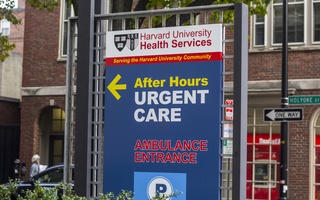Members of the committee that recommended controversial changes to Harvard’s non-union health benefits plan said it will likely change in the future, though they have yet to determine the nature of such revisions.
Discussions and debate surrounding the health benefits plan, which was first unveiled last September and rolled out this January, have been ongoing. Over the past few weeks, the University Benefits Committee that recommended the changes held three information sessions for faculty and other non-union University employees under the plan, fielding questions from attendees and explaining their rationale for recommending the changes.
Last November, University President Drew G. Faust announced that the UBC would host the information sessions following a semester-long back and forth between faculty members and administrators, which culminated in a vote by the Faculty of Arts and Sciences to request a repeal of the health benefits changes.
“It’s very likely there will be changes, but that remains to be determined, because there are changes always happening,” said UBC member Joseph P. Newhouse, a professor of health policy at several Harvard schools. “That was the point of these meetings.”
According to members of the UBC, about 30 to 40 people have attended each of the meetings, which were held in Cambridge and Longwood over the past few weeks. Though members of Harvard’s Faculty have been the most vocal critics of the new plan, Sociology professor Christopher Winship said many staff members attended Friday’s meeting.
For their part, “a group of concerned Harvard exempt staff members” have created an online forum called openharv.org to engage peers in anonymous discussions about the benefits changes.
FAS Dean for Faculty Affairs and Planning Nina Zipser and three members of the UBC sat on a panel at one of the planned information sessions, held at the Kennedy School of Government on March 20, according to Maeve C. Kelley, assistant to Vice President for Human Resources Marilyn Hausammann, who was also present.
According to Winship, the meeting on March 20 began with a short presentation on the current health plan. The subsequent panel included an explanation of the rationale for the health benefits plan changes, as well as discussion of individual scenarios and issues that the plan raised among attendees and the future of Harvard’s health benefits plan, according to UBC members.
UBC chair Michael E. Chernew, a professor at Harvard Medical School, said he thinks the meetings have, overall, been “constructive” and feedback from the attendees will help guide further UBC discussions on the health benefits plan.
“We are continuing looking at the benefits plans,” Chernew said. “I do think that always, going forward, we will take into account the feedback of the community in making changes.”
Chernew said the meeting in Longwood on March 16 made clear problems that postdoctoral fellows say they have faced under the new plan.
“They earn substantially less than faculty members in general, and they are concerned that the cost sharing that is imposed on them is particularly burdensome given their income level,” Chernew said, adding that out-of-pocket spending and financial pressures created by childbearing also contributed to anxieties for post-docs. “That’s a legitimate concern.”
Moving forward, according to Chernew, the UBC has three items on its current agenda: to assess the 2015 health benefits plan and look at other possible plans for next year; to improve communications between the UBC and people affected by its recommendations; and to measure the impact of the changes to the 2015 plan. Additionally, Chernew will attend the Faculty Council’s meeting this Wednesday.
“It’s a continual journey to try to get the benefits right at Harvard,” Chernew said.
—Staff writer Meg P. Bernhard can be reached at meg.bernhard@thecrimson.com. Follow her on Twitter @meg_bernhard.
Read more in University News
Law School Dean of Students To Depart This SummerRecommended Articles
-
Varsity C Squash Team Beats UBC; '53 Squad WinsBoth the varsity C and the freshman C squash teams won shutout victories in matches yesterday. The varsity topped the
-
Benefits Report Finally ReleasedThe University yesterday released the final report of its year-long review of employee benefits. The report is the basis for
-
Benefits Committee ChosenThe new University Benefits Committee (UBC), chaired by Provost Albert Carnesale, has been named and will start regular meetings in
-
Why the Health Plan ChangedYes, we anticipate that health care costs will continue to rise for Harvard—but these changes ultimately are designed to slow the rate that those costs will grow in coming years, ensuring fewer resources are diverted away from Harvard’s research and teaching mission, and offering a benefit that offers value to members of our community.
-
Benefits Changes Roll Out as Planned, Despite UproarA day after FAS Faculty unanimously voted to condemn the changes, controversial health benefits changes rolled out as planned Wednesday.
-
 Stillman Closure Prompts Concern As UHS Releases More Details
Stillman Closure Prompts Concern As UHS Releases More Details













